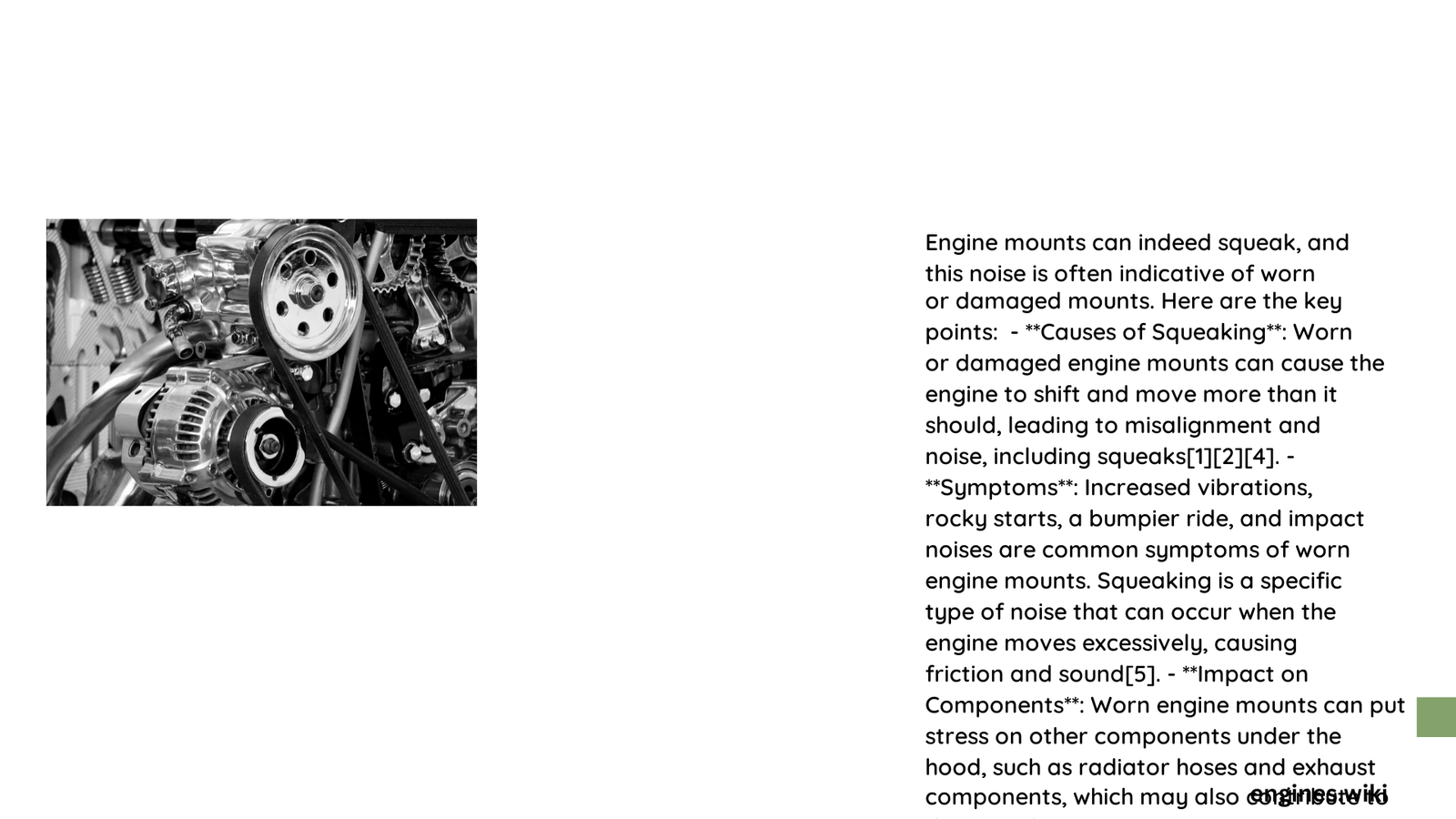Engine mounts are critical components that support and stabilize your vehicle’s engine, absorbing vibrations and reducing noise. When these mounts deteriorate, they can produce unexpected squeaking sounds that signal potential mechanical problems. Understanding the mechanics behind these noises can help vehicle owners diagnose and address issues before they escalate into more expensive repairs.
What Causes Engine Mount Squeak?
Why Do Engine Mounts Develop Squeaking Noises?
Engine mounts can squeak due to several interconnected factors:
- Material Degradation
- Rubber composition breaks down over time
- Exposure to heat and moisture accelerates wear
-
Chemical breakdown reduces mount elasticity
-
Mechanical Stress Factors
- Constant engine vibrations
- Extreme temperature variations
- Driving conditions (rough roads, frequent acceleration)
What Are the Primary Types of Engine Mounts?
| Mount Type | Characteristics | Potential Squeak Causes |
|---|---|---|
| Rubber Mounts | Flexible, cost-effective | High heat/moisture degradation |
| Hydraulic Mounts | Advanced vibration absorption | Internal fluid leakage |
| Solid Mounts | Minimal flexibility | Direct metal-to-metal contact |
How to Identify Engine Mount Squeak Symptoms?

What Specific Signs Indicate Worn Engine Mounts?
Vehicle owners should watch for these critical indicators:
- Audible Symptoms
- Squeaking during acceleration
- Creaking noises when changing gears
-
Rhythmic grinding sounds
-
Physical Symptoms
- Excessive engine movement
- Increased cabin vibrations
- Visible rubber mount deterioration
What Are Diagnostic and Repair Strategies?
How Can You Address Engine Mount Squeaking?
Professional Diagnostic Process:
1. Visual mount inspection
2. Vibration pattern analysis
3. Comprehensive mount stress testing
Repair Recommendations:
– Replace individual damaged mounts
– Use manufacturer-recommended replacement parts
– Ensure proper alignment during installation
What Are Potential Repair Costs?
Estimated Expense Breakdown:
– Single mount replacement: $150 – $350
– Labor costs: $75 – $150 per hour
– Total repair range: $225 – $500
Prevention and Maintenance Tips
How to Extend Engine Mount Lifespan?
- Regular vehicle maintenance
- Avoid aggressive driving techniques
- Periodic professional inspections
- Monitor driving conditions
Technical Insights
Engine mount squeaking represents more than just an annoying noise—it’s a critical mechanical communication system indicating potential systemic issues. Professional mechanics recommend addressing these sounds promptly to prevent more extensive and expensive damage.
Pro Tip: Never ignore persistent engine mount squeaks, as they could signal underlying mechanical stress that might compromise vehicle safety and performance.
Conclusion
Understanding engine mount squeaking requires a holistic approach combining mechanical knowledge, diagnostic skills, and proactive maintenance. By recognizing early warning signs and taking appropriate action, vehicle owners can ensure optimal engine performance and longevity.
